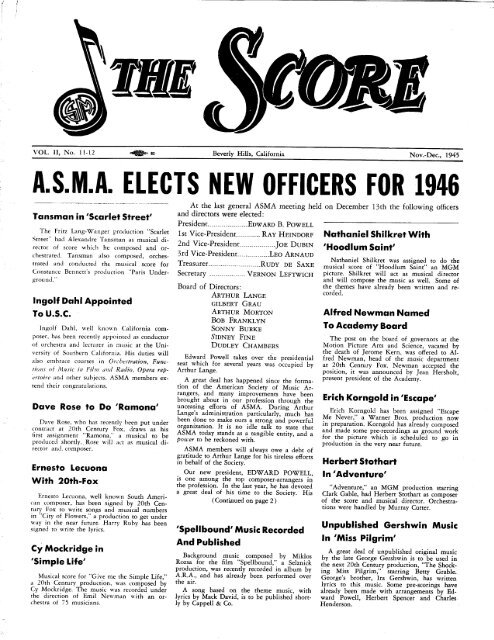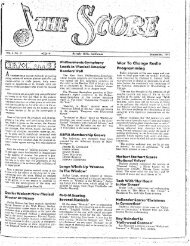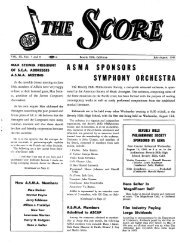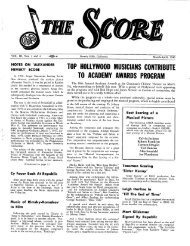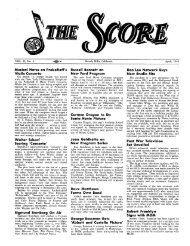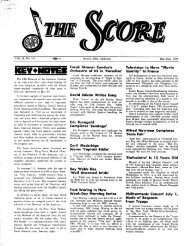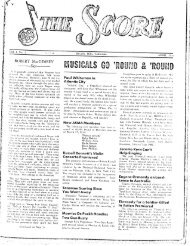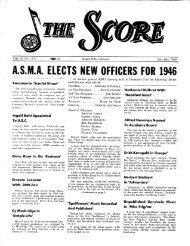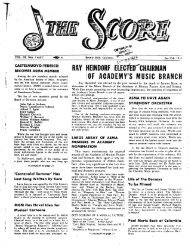A.S.M.A. ELECTS NEW OFFICERS FOR 1946 - ASMAC.org
A.S.M.A. ELECTS NEW OFFICERS FOR 1946 - ASMAC.org
A.S.M.A. ELECTS NEW OFFICERS FOR 1946 - ASMAC.org
- No tags were found...
Create successful ePaper yourself
Turn your PDF publications into a flip-book with our unique Google optimized e-Paper software.
Collaboration BetweenComposers' ProfessionalBodies and OtherOrganizationsBy VIRGIL THOMSON(The all-i'itai issue of group action bij professional"<strong>org</strong>anization is clearly analyzed here byVirgil Thompson, well known composer aridmusic critic. This article, taken from "THESTATE OF MUSIC" is reprinted few permissionof William Morrow and Co., AT.Y. The opinionsexpressed btj Mr. Thompson are his own, andtlo not necessarily reflect those of "THE SCORE"or the American Society of Music Arrangers.—Ed.)The only known way for any craft or professionto raise its economic and civil status isby group action through its trade-unions andits professional bodies.I believe that trade-unions and professionalbodies must function as groups (and as groupsof groups). • !Collaboration between composers' professionalbodies and the unions of executant musicians,which form, in turn, a part of the generallabor federations, will in the long run bea more fruitful collaboration than the presentpooling of interests between composers andpublishers that is the operating basis of all theperforming-rights societies. I think this forthree reasons:1. The present mechanism of our collaborationwith publishers provides no means foradjudicating disputes between composers andpublishers that arise from a disparity in theirinterests.2. The publishers themselves, mostly smallcapitalists, are at any moment likely to findthemselves owned by large banking and industrialpools. The only possible way for composersto obtain any recognition by publishersof their legitimate divergencies of interest willbe through the aid of some equally powerfulcombination or <strong>org</strong>anization. The general laborfederations are the only non-capitalist <strong>org</strong>anizationsin existence that have that kind ofpower.3. The performing-rights societies are private<strong>org</strong>anizations that collect taxes from publicand private musical enterprises. They are atpresent tolerated by most governments. Theirposition, however, in both law and equity isfar more tenuous than that of the collectivebargainingassociations. They are constantlybeing sued as combinations in restraint oftrade and as profit-making <strong>org</strong>anizations whoseturn-over should be taxable by municipalities,states, and central governments. So far theyseem to have resisted these attacks effectively,most of which are financed by radio companies,movie companies, and similar large tie-upsof electrical patents with banking. The minutethe publishers shall have been bought out bythese same tie-ups, any association of composersand publishers will be just a company unionfor the electrical recording-and-transmissioncombines.Do not think that 1 am proposing an industrialunion of all music-workers. 1 don'tthink that would be a bad idea for executantmusicians, copyists, arrangers, musical engravers,teachers, and persons who make musicalTHE SCOREinstruments. Such a development seems to betaking place in America through the AmericanFederation of Musicians (actually a craftunion,but moving rapidly toward the absorptionof all music-workers). I should approvehighly of such a union, but I do not see muchplace in it for composers, excepting in so faras these may be also pianists or teachers orsome other kind of time worker. Because, inspite of all the community of interests and ofunderstanding that exists between the composersand the other musicians, the fact remains thatworkers who work under somebody else's direction,executing somebody else's plan, andgetting paid for it by the hour, have a completelydifferent view of life and a different setof financial interests from persons who workprivately, time not being of the essence at all,and who get paid for a piece of work not ona basis of how long that work took to getwritten but on the basis of how long it takesto play it and how many people listen, whoget paid proportionally, that is, to the usagetheir work receives.The chief characteristics of professional menare their economic independence and their intellectualauthority. That authority and thatindependence are obtained by never chargingthe customer for preparation, experiment, orcorrection but by accepting payment only forprofessional services rendered. Different kindsof work are measurable for payment in differentways. The time a composer actually takes towrite a given piece is not a reasonable or possibleway of measuring that work's commercialvalue. Its value for payment must be measuredby its utility, as all professional services are.Consequently, the composer would be foolishto submit his economic destiny and the protectionof his professional interests to any federationof mere musical workmen, at least 99.99per cent of whose work is measurable for payingpurposes by the time they spend doing it.The high-powered soloists and conductors area little more like us than the anonymous instrumentalistsare. They prepare privately, acceptin their own name responsibility for publicfailure, and charge what the market will bear.But even these glamorous characters are notindependent and authoritative workmen. Theyexecute somebody else's design, usually on order.Any freedom they have about repertory(even about style) exists only within the narrowlimits predetermined by managers. Itwould not be proper for a composers' professionalbody to accept any direction whateverfrom, or any equality in voting with, professionalinferiors.(To be continued)Ge<strong>org</strong>e BassmanTo Have 'Postman'The MGM production "The Postman AlwaysRings Twice" with Lana Turner, now beingcompleted, will have Ge<strong>org</strong>e Bassman as composerof the musical score.Swing vs. Classical MusicSwing or the Classics—which do you prefer?The perpetual battle over the respectivemerits of the "pops" and the "longhairs" isthe basis of a unique radio series, "The RCAVictor Show," launched Sunday, Dec. 2, (NBC,1:30 p.m.) with a topflight talent line-up includingRaymond Paige and his orchestra andchorus; Deems Taylor and Leonard Feather asleaders of the opposing musical factions. KennethDelmar is emcee and moderator.Taylor, composer, critic and raconteur, representsthe interests of the "longhairs," whileFeather, music columnist, songwriter and radio"platter jockey," champions the swingsters.Program format involves droll verbal tiffs betweenTaylor and Feather, with Paige's orchestra,the chorus and guest soloists providingthe musical "case histories" to illustrate thearguments.WALLENSTEIN ANDFILM MUSIC(Continued from page 3)standard repertoire. But let us not f<strong>org</strong>et, too,that he has brought motion picture music tothe concert hall, and it is there to stay.Unfortunately when Mr. Wallenstein refersto the composer who is allowed several monthsto compose a score, he is talking of the rareexception rather than the rule. If Hollywoodcomposers,—and I am referring to our very topmen in the major studios—are allowed two tothree weeks to write a score, they considerthemselves fortunate.Time, or rather the lack of it! That seemsto be the major problem facing the Hollywoodcomposer. How can a producer be convincedthat he should allow more time to a composerto write his music, w:hen up to now he's beenaccustomed to have the goods delivered in aweek or so?Yes, this is a tough job to tackle, a job requiringpractically a procedure of re-education.The Industry should be awakened to the factthat film music can be a work of art as wellas background to the action on the screen. Ifpopular songs used in pictures are so thoroughlyexploited because of their potential value as amedium of advertising, why not use the musicalscore for the same purpose?The motion picture composer is wellequipped to give an excellent account of hiscapabilities as a musician. More fortunate thanhis colleague—the so-called serious composerheis given ample opportunity to experiment,and under the most favorable and remunerativeconditions at that. All sort of tricks, devicesand orchestral effects used in scoringpictures, have added immeasurably to his knowledgeof orchestral colouring.And when we add to this tremendous technique,a natural flair for showmanship, and inspiration,rfe have all the elements necessaryfor the making of good concert music.Let us not f<strong>org</strong>et, after all, that music,whether it is for the theatre, motion picture orconcert hall, is primarily a matter of showmanship.Wagner and Beethoven were well awareof this long ago.
PICK-UPSBy JOE DUBIN• At long last I have arrived! Someone hasfinally taken exception to something in mycolumn, which proves that people actually readthe doggone thing!• In the ten years I have spent in and aroundthe movie mills, I have often heard the phrase,"Mickey Mouse" music, used to describe musicwhich synchronizes with the physical action onthe screen, rather than mirroring the over-allmood of that part of the picture.• In other words, when a character walks orlimps across the screen, and the music walksor limps with him or her; when the hero hitsthe villain on the chin and knocks him down,and the orchestra smacks chords right withthe blow and the fall; or when a flute or celestehelps blow out a candle or lantern; these exactmarchings of music and action have been describedas "Mickey Mouse-ing" a scene.• But it seems that Oliver Wallace, CharlieWolcott, and the rest of the eminent and talentedmusic staff of Walt Disney productions,object most strenuously to this term. Theirargument is quite valid. As they say, the scorein cartoons, or rather animated pictures, nowmakes just as much use of mood music, entirelyunrelated to physical action, as does the scoreof the average picture using live actors. Therefore,they say, the term "Mickey Mouse" musicdoes not represent solely physical music, andshould no longer be used in this sense.• Well, ladies and gentlemen, there you haveir. I would appreciate hearing from any of myreaders on this question, especially these twofacets of it:• A: Do you think the term "Mickey Mouse"as applied to music mirroring physical action,(which would certainly include most of RichardStrauss' compositions, especially "Salome"and "Till Eulenspiegel") has a derogatory implication?• B: What else would you call it?Busy Days at RepublicBusy days are looming ahead at RepublicStudios with Walter Scharf preparing theafter-score of Republic's first technicolor production,I've Always Loved You, formerly"Concerto," as well as readying two other productions,Murder in the Music Hall and EarlCarroll's Sketch-Book, Assisting Walter Scharfwith these two productions will be Joe Dubin.SAN ffflNAiO PRINTING CO.1307 Bond St., Los Angeles, CaliforniaPRospect 1388Score and Manuscript Paperfor the Professional MusicianTHE SCORESCOREBOARDALEX STEINERT composed, orchestratedand conducted "Strangler of theSwamp," PRC.CHARLES KOFF orchestrated on "Abilene,"United Artists.RALPH HALLENBECK arranged on "BlueSkies," and "Monsieur Beaucaire,"Paramount, also on "Young Widow,"H. Stromberg.RUDY SCHRAEGER composed, orch. andconducted "People are Funny," Paramount.MURRAY CUTTER orchestrated "Adventure,"MGM.WALLY HEGLIN orchestrated on "UpGoes Maisy," MGM.BOB PRANKLYN arranged and orchestratedon "Two Sisters from Boston";•• also "Up Goes Maisy," and "Till theClouds Roll By," MGM.CALVIN JACKSON composed on "TwoSisters From Boston," MGM.CONRAD SALINGER arranged on prescoringof "Till the Clouds Roll By,"MGM.TED DUNCAN orchestrated on "TwoSisters from Boston," "Up GoesMaisy" and "Till the Clouds Roll By,"MGM.CY MOCKRIDGE composed score to "Giveme the Simple Life," 20th Cent.ARTHUR MORTON orchestrated on "GiveMe the Simple Life"; "Fallen Angel"and "Shock," at 20th Cent.MAURICE DE PACKH arranged on "ThreeLittle Girls in Blue," and "Doll Face,"at 20th Cent.DAVID BUTTOLPH composed score to"Shock," also arranged on "DollFace," 20th Cent.DAVID RAKSIN composed score to "FallenAngel," and wrote song "Slowly"in the picture at 20th Cent.EDWARD POWELL arranged on "TheShocking Miss Pilgrim," 20th Cent.HERBERT SPENCER arranged on "DollFace," and "The Shocking Miss Pilgrim,"20th Cent.GENE ROSE arranged on "Doll Face,"20th Cent.SONNY BURKE arranged on "Doll Face,"20th Cent.EDWARD PLUMB orchestrated on "GiveMe the Simple Life," and "Doll Face,"20th Cent.JOE DUBIN composed score to "Madonna'sSecret," Republic.DALE BUTTS composed score for "TheCatman of Paris," also pre-scored vocalsfor "In Old Sacramento," Republic.CHARLES MAXWELL orchestrated "TheCatman of Paris," Rep., also "Sunsetin the Pacific," Warners.WILLIAM LAVA composed score of "Sunsetin the Pacific," Warners.(Continued on page 8;[The new price list for arrangers working forpublishers has iuxt come out. This new editionis ecen more complicated than the previousissue. Ottr old frietifl Sir Algernon Stumhlepokc(alias Adt>lph Dcutsch), is Ixick at it, "poking"at the new list. By pvptdiir demand we are reprintinghis article on the subject, which appearedin the March 1944 w.sue of "Tin: SCORE."-Ed.]POKINGSBy SIR ALGERNONSTUMBLEPOKEI'm taking a week off tofigure nit the new pricelist for arrangers workingfor music publishers.Frankly, I'm a little worried about gettingthrough in a week, maybe I'll stay a month.When I get back there won't be a guy in thearranging business who'll know more about itthan I will. Maybe I'll quit arranging andbecome a bill auditor for musicians. BAFMfor short.I'll charge them ten per cent for figuring outhow much they've earned. They can deductmy fee from their income tax.Some of the boys might think a BAFM isjust another racketeer, but I've seen severalcases of arrangers short-changing themselves.One dope (I won't mention names) wascharging 22 cents for second piano parts insteadof 27 cents. Another-"genius" was charging27 cents instead of 33 cents. It's only anickel a page, but those nickels acid up.I'll be able to plug up loop holes that somechiseling publishers will be sure to find. Forinstance, one publisher I know of has a Hawaiiancook, and she has been doing the cooking,the dishwashing, and all of his ukelelesymbols.Another publisher, who is quite religiousand goes to church every Sunday, takes hislead sheets to the <strong>org</strong>anist and gets him tomake piano sketches. It works out fine, exceptevery once in a while an "Amen" gets intothe dance orchestration. Incidentally, an"Amen" costs 83 cents for twelve (12) andpiano.One especially shrewd publisher is goingthrough all of his old publications and liftingout introductions, interpolations, and first andsecond endings. When you arrange a tunefor him you leave all of these things out, andhis head copyist (who is on a weekly salary)pastes in a suitable set. I saw one of theseorchestrations in print and here's the way thecredits read:Words by:Irving DonaldsonOriginal Piano Part by:Reverend AloyisiousS my theUkulele Symbols by:Moana LuluCopied by:Guiseppe Largo LucelliProof Reading by:Tod McCarthyHE'S MY G. I. JOE"Modulations by:Domenico SavinoMusic by;Jerome "Pinkie'Schwartz.Arranged by:Jack KolodinIntroduction by:Arthur Lange1st Endings by:Ted Eastwood2nd Endings by:Sam KatzmanA fine example of the melting pot at work;democracy in action. Keep your embouchureopen.
New Music LiteratureMUSICTansman—Four Piano Moods, pianoFuleihan—Sonatina No. 2, pianoCzerny-Rode—Variations on a Theme La Ricordanzo,pianoC.P.E. Bach—Six Sonata, pianoSibelius—Violin Concerto op. 47, MiniatureOrchestra ScoreWalter Piston—Three Pieces for Flute, Clarinetand BassoonRudolph Ganz—Concerto in Eb Major op. 32,2 pianosRobert Casadesus—Danses Mediterraneenes op.36BOOKSMax Graf—Legend of a Musical CityKatz—Challenge to Musical TraditionDavid and Arthur Merdel—Bach the ReaderDorothy Caruso—Enrico Caruso His Life andDeathTHE SCOREScoreboard(Continued from page 7)MORT GLICKMAN orchestrated "The Madonna'sSecret," Rep.RAY HEINDORF scoring "Night andDay," Warners.OLIVER WALLACE composed and orch."In Dutch," also "Frank Buck Brings'em Back Alive," Disney.SlD FINE arranged Dinah Shore's vocalsfor "Bongo," Disney.CLIF<strong>FOR</strong>D VAUGHN orchestrated "Rangein White," Warners.HUGO FRIEDHOFER orchestrated background,.music to "Night and Day,"Warners.MARLIN SKILES assigned to composescofe to "Gilda," Columbia.RUDY DE SAXE arranging three numbersto be published by Peer Int.Work Starts on NewDon Lee StudiosGround breaking ceremonies for the DonLee Broadcasting System's new $1,250,000Hollywood studios to be located on Vine Streetbetween Homewood and Fountain will be heldshortly after the first of the year, it was announcedby exeor 'ves of the network.The three-story building will feature a 150foot tower, equipped with an elevator, whichwill house antennas for television sight andsound for FM. Main entrance to the new studioswill be centered on Vine Street, with employeesand talent entrances in the rear of rhebuilding.Ground floor will be devoted to studios,with four theater studios seating 350 persons,four medium sized studios, and three smallerstudios. On the second floor, general offices willbe located with executive offices on the topfloor. The entire building will be- air-esndi *tioned and temperature controlled, with liberaluse of modern plastics and glass throughout.LET THIS BE ABOOK REVIEWBy RUTH DE SAXECHALLENGE TO MUSICAL TRADITIONby Adele T. Katz-Alfred A. Knopf, New York1945.Dealing with changes in musical structureduring the past three hundred years, this bookpresents primarily a new point of view fromthe accepted method of modulation throughkey relationship.Following closely the ideas first formulatedby Heinrich Schenker, Miss Katz ably demonstrateswith examples from Bach, Beethoven,Wagner, Debussy, Stravinsky and Schonberg,the various changes of technique that havetaken place through the centuries within thetonal concept.For the musician and advanced music student.<strong>NEW</strong> LOCATIONKENNETH S. YERKEInsurance ManagementService•6049 Hollywood Blvd.GL. 7105 HE. 5705REAL "FINALE"WITHOUT A "CODA"Buy VICTORY BONDSJohn xle Keyser ancf ^Company625 SourK Grand - Los Angeles 14, California - MU tual 1666' MUSIC DEALERS ALL PUBLICATIONS DOMESTIC AND <strong>FOR</strong>EIGN!HEADQUARTERS <strong>FOR</strong> CONTEMPORARY MUSICComplete Stock of Orchestra Scores and Chamber MusicPostmaster — If undeliverable for any reason,please notify sender at P.O. Box 807, BeverlyHills, California, staring reason on Form 3547,postage for which is guaranteed.THE AMERICAN SOCIETYOf MUSIC ARRANGERSARTHUR LANGE. Pmid,atVice-PresidentsRAY HBINDORFSecttlatgVERNON LEFTW1CHMARLIN SKILES TreasurerFRANK HUBBELL ARTHUR SCHOEPPMailing Addun:P.O. Box 807, Beverly Hill). CaliforniaBooed of DirectorsEdward Powell, Charles Maxwell. Gilbert Gran.Arthur Morton. Sonny Burke, Ge<strong>org</strong>e DuningJoseph Dubin. Dudley ChambersAlva Joesting,1514 Seventeenth St.,N.W,Wash ington, D.C.- S/A-


